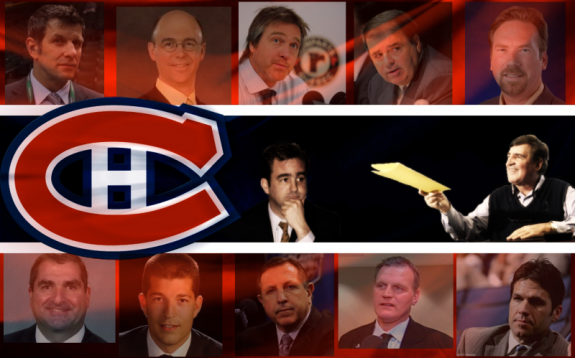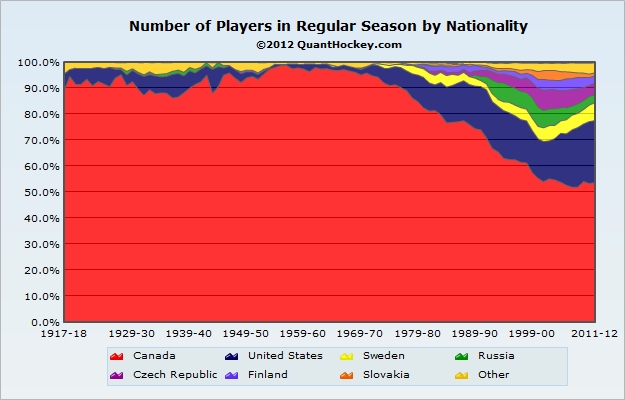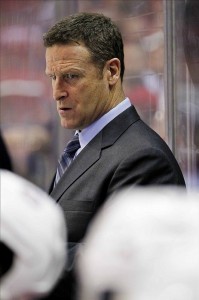
When the call went out last spring that the Montreal Canadiens were in the market for a new GM and head coach there was a clear disclaimer, those who could not speak French need not apply. In fact, if French wasn’t your mother tongue, you would probably be wasting your time as well. Not that someone who couldn’t speak the language would necessarily want the job, Randy Cunneyworth was put through the ringer in his four months behind the bench, and he was just the interim coach.
Next June will mark 20 years since Les Glorieux last brought home a Stanley Cup. Current Canadian senator Jacques Demers was at the helm that year and Serge “The Senator” Savard was GM. A lot has changed in the NHL in the last 20 years, so is it time for the Canadiens to consider changing their hiring policy as well?
The Glory Years
The early 90’s may very well have been the high point for Quebec hockey. Mario Lemieux was the dominant player winning the Art Ross trophy in ’88, ’89, ’92 and ’93 and the Conn Smythe in ’91 and ’92. Patrick Roy was the dominant goalie with Vezina trophy wins in ’89, ’90 and ‘92. From 1991 to 1993 Lemieux’s Penguins and Roy’s Habs owned the Stanley Cup in convincing fashion. The two teams combined for a 48-17 playoff record during their three Cup runs. Mario Lemieux had 96 points in 49 playoff games during that span while Roy had a 27-16 record.
In ‘93, the Canadiens’ roster was bursting with Quebec-born talent. Montreal native Vincent Damphousse was the team’s leading scorer, Sept-Iles’ Guy Carbonneau was captain, and of course Quebec City’s Patrick Roy led the way in nets winning a record 10-straight overtime games on the way to the Cup win. Rouyn-Noranda’s Eric Desjardins scored a hat-trick in game 2 of the finals against L.A., including the overtime winner, which (along with Marty McSorley’s infamous stick infraction late in the game) is considered to be the turning point of the series. Desjardins remains the only defenceman to score a hat-trick in a Stanley Cup Final Series game.
Of the 27 players who had their names engraved on the Cup that year, 13 were Quebec-born.
But the times they were a changin’.
Even in ’93 the influx of European players was well underway. Much of Pittsburgh’s success in the early ‘90s was thanks to a young Czech named Jaromir Jagr. Pavel Bure won the Calder Trophy as rookie of the year in ’92. In ’93, with 76 goals and 132 points, Finnish sensation Teemu Selanne won the Calder putting up numbers that are tough to match by most players from any region, let alone rookies.
After North American born players won all but five Calder Trophies between 1933 and 1989, Europeans won the award 6 times in the ‘90s.
1993 also marked the year Saku Koivu was drafted. Before the turn of the century, Koivu would become the first European-born captain of Les Glorieux.
The Canadiens Today
Flash-forward to the would-be Habs of the 2012-2013 season. Laurier-Station native David Desharnais is the only Quebec born player on the Habs’ roster. Francis Boullion has Quebecois roots as well, his mother is Quebecoise and although he was born in New York City he was raised in La Belle Province. That’s where the home-grown talent ends for Montreal.
The graph below from www.quanthockey.com shows how Canadian dominance in the NHL has been steadily chipped away. While Canadian born players made up two thirds of the NHL in 92-93, they now make up just over half the league. The share of US players has risen dramatically, and while the influx of European talent has actually slowed since its peak at the start of the millennium it is still higher than any point before 1990.

In Quebec, the change has been even more drastic. In ’93 over 100 Quebec-born players played at least one NHL game, 74 played 20 or more. Last season, there were only 71 players from Quebec that played at least one game and 51 that played more than 20.
The Canadiens current roster is pretty typical for the new NHL. Players from the US and Ontario are having more and more of an impact while players from Quebec are falling by the wayside. Last year, Max Pacioretty became the first American to score 30 goals in a Habs uniform, Erik Cole became the second shortly after. Another American, Brian Gionta, is the team’s captain. P.K. Subban is a fan favorite in Montreal despite hailing from Toronto, while Russia’s Andrei Markov and the Czech Republic’s Tomas Plekanec are two of the longest serving Habs.
In fact, before Geoff Molson purchased the team in December ’09, the Canadiens were even owned by an American. In 2001, George Gillett became the team’s first American owner since Léo Dandurand sold the Habs in 1935.
So why is it that the Habs are able to pluck people from all backgrounds to fill their roster and even their owner’s box, but not their coaching staff or front office?

The reality of Quebec politics applies strongly to one of the province’s most cherished institutions. The backlash against Randy Cunneyworth is just the most recent example. Cunneyworth’s appointment resulted in everything from staged protests, to calls to boycott Molson beer products, to condemnation from Quebec’s culture minister. At the same time Canadiens Legend and much loved icon, Guy Lafleur, did come to Cunneyworth’s defence, “It doesn’t matter if you speak German, Russian, or whatever, the bottom line is: Win the games and then make the playoffs and try to win the Stanley Cup.”
Does the Flower’s blessing mean it’s finally ok for the Sainte Flanelle to hire an English coach or GM? Yes and no. Simply put, the ability to communicate with the team’s fans and Quebec media is part of the job description. Call it discrimination or pragmatism, hiring an English coach, or even a bilingual coach whose mother tongue is English would inevitably lead to off-ice distractions that could keep the team from achieving their potential.
Perhaps one day a full-time, unilingual English coach could be a reality in Quebec, but that person would need to be a much better candidate than any of the French coaches available. And even then, the odds wouldn’t be that high.